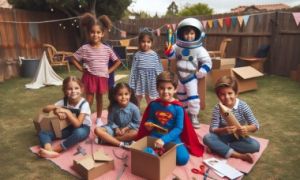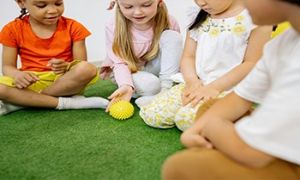

A: Group time is not strictly necessary, but when thoughtfully designed, it can be a powerful tool for fostering connection, communication, and community in early childhood settings.
Here’s a clear and practical guide for ECEC Services in NSW based on the compliance and quality history display requirements outlined on the NSW Education website.
Educator ratios must be upheld at all times, including during care tasks unless supervision is compromised, in which case coverage is legally required. Here’s a guide to help educators understand their rights and responsibilities around ratios and supervision, with more examples and direct links to authoritative sources.
In the ongoing discourse around quality early childhood education, educator-to-child ratios often dominate the conversation. While ratios are undeniably important for supervision and safety, a critical yet under-addressed factor is the physical space allocated to each child. The reality is stark: even with ideal ratios, overcrowded rooms can undermine well-being, learning outcomes, and emotional safety.
Gossip is more than idle chatter; it’s a signal. In early childhood settings, where emotional labor runs high and relationships form the bedrock of quality practice, gossip can quietly unravel team cohesion. It erodes trust, fractures relationships, and creates emotional harm. But beneath the surface, gossip often reflects unmet needs, fear, and disconnection. The following article explores how restorative leadership can transform gossip into growth, offering practical strategies to rebuild emotional safety and team culture.
In the emotionally charged landscape of early childhood education, departmental decisions can feel final, overwhelming, and deeply personal. Whether it's a compliance breach, funding suspension, or licensing issue, educators often feel unheard, unsupported, and unsure of their rights. But procedural fairness is not a privilege—it’s a legal and ethical obligation. This guide aims to restore clarity, confidence, and emotional safety for those seeking to contest decisions with integrity and strength.
In early childhood education, ratios are more than numbers. They are the heartbeat of safety, connection, and quality care. Yet across Australia, educators are sounding the alarm: current ratios are failing both children and staff. The sector is bleeding talent, and the emotional toll is mounting. It’s time to reform ratios—not just to meet minimum standards, but to honour the dignity of every child and the well-being of every educator.
In the fast-paced rhythm of early childhood settings, transitions often feel like logistical hurdles—moments to be managed, timed, and moved through. But what if we reframed them as sacred pauses? As opportunities to restore emotional safety, deepen connection, and honour the inner worlds of both children and educators?
In early childhood education, some of the most powerful interventions don’t come from elaborate programs or expensive resources. They come from the quiet, intentional words educators choose in moments of emotional intensity. When a child’s body is flooded with frustration, fear, or sadness, it’s not logic they need; it’s presence. And that presence often begins with a few carefully chosen words. This article explores how emotionally intelligent language, gentle presence, and intentional silence can transform a child’s experience of safety, identity, and belonging.
Inquiry-based learners are curious, active participants in their own learning journey. Instead of passively receiving information, they ask questions, explore possibilities, and investigate real-world problems to construct their own understanding. The following is a breakdown of what defines an inquiry-based learner:
 Here is the list of the EYLF Learning Outcomes that you can use as a guide or reference for your documentation and planning. The EYLF… Read More
Here is the list of the EYLF Learning Outcomes that you can use as a guide or reference for your documentation and planning. The EYLF… Read More
 The EYLF is a guide which consists of Principles, Practices and 5 main Learning Outcomes along with each of their sub outcomes, based on identity,… Read More
The EYLF is a guide which consists of Principles, Practices and 5 main Learning Outcomes along with each of their sub outcomes, based on identity,… Read More
 This is a guide on How to Write a Learning Story. It provides information on What Is A Learning Story, Writing A Learning Story, Sample… Read More
This is a guide on How to Write a Learning Story. It provides information on What Is A Learning Story, Writing A Learning Story, Sample… Read More
 One of the most important types of documentation methods that educators needs to be familiar with are “observations”. Observations are crucial for all early childhood… Read More
One of the most important types of documentation methods that educators needs to be familiar with are “observations”. Observations are crucial for all early childhood… Read More
 To support children achieve learning outcomes from the EYLF Framework, the following list gives educators examples of how to promote children's learning in each individual… Read More
To support children achieve learning outcomes from the EYLF Framework, the following list gives educators examples of how to promote children's learning in each individual… Read More
 Reflective practice is learning from everyday situations and issues and concerns that arise which form part of our daily routine while working in an early… Read More
Reflective practice is learning from everyday situations and issues and concerns that arise which form part of our daily routine while working in an early… Read More
 Within Australia, Programming and Planning is reflected and supported by the Early Years Learning Framework. Educators within early childhood settings, use the EYLF to guide… Read More
Within Australia, Programming and Planning is reflected and supported by the Early Years Learning Framework. Educators within early childhood settings, use the EYLF to guide… Read More
 When observing children, it's important that we use a range of different observation methods from running records, learning stories to photographs and work samples. Using… Read More
When observing children, it's important that we use a range of different observation methods from running records, learning stories to photographs and work samples. Using… Read More
 This is a guide for educators on what to observe under each sub learning outcome from the EYLF Framework, when a child is engaged in… Read More
This is a guide for educators on what to observe under each sub learning outcome from the EYLF Framework, when a child is engaged in… Read More
 The Early Years Learning Framework describes the curriculum as “all the interactions, experiences, activities, routines and events, planned and unplanned, that occur in an environment… Read More
The Early Years Learning Framework describes the curriculum as “all the interactions, experiences, activities, routines and events, planned and unplanned, that occur in an environment… Read More

Erik Erikson’s theory of psychosocial development is a great framework for designing activities that support...
See more...
Schematic play refers to repeated patterns of behavior that children exhibit as they explore the...
See more...
The National Law and the National Regulations illustrate the legal responsibilities of the approved provider...
See more...© 2009-2025 Aussie Childcare Network Pty Ltd. All Rights Reserved.

